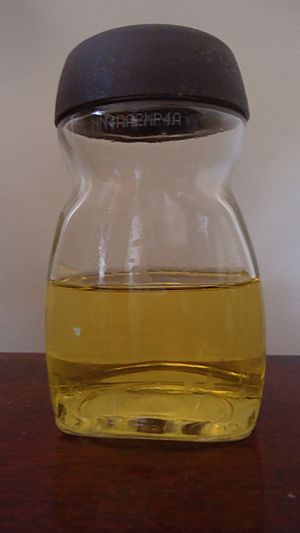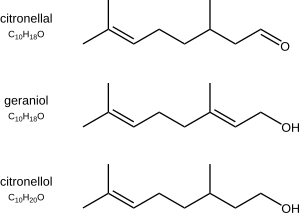Citronella oil facts for kids
Citronella oil is a special kind of oil called an essential oil. It comes from the leaves and stems of different types of Cymbopogon plants, which are also known as lemongrass. This oil is used a lot to make things smell nice, like citronellal, citronellol, and geraniol.
These chemicals are used all over the world in many products. You can find them in candles, incense, soaps, perfumes, and even some foods for flavor.
Citronella oil is also famous for being a natural way to keep bugs away. The United States has allowed it to be used as an insect repellent since 1948. The United States Environmental Protection Agency (EPA) thinks citronella oil is a biopesticide. This means it's a natural way to control pests, and it works without being harmful. Citronella oil also has strong properties that fight against fungi.
Contents
Types of Citronella Oil
Citronella oil comes in two main types. They are named after where they were first widely produced.
Ceylon Type
This type of citronella oil comes from the Cymbopogon nardus plant. Its main parts are citronellal (5–15%), geraniol (18–20%), and citronellol (6–8%). It also has limonene (9–11%) and methyl isoeugenol (7–11%).
Java Type
The Java type oil comes from the Cymbopogon winterianus plant. It has more citronellal (32–45%) and geraniol (21–24%). It also contains citronellol (11–15%) and limonene (1–4%).
Because the Java type oil has higher amounts of citronellal and geraniol, it's better for making perfumes. For example, in Indonesia, the Java type oil must have at least 35% citronellal and 85% total geraniol to be considered good quality.
Both types of citronella oil likely came from a plant called Mana Grass in Sri Lanka. It's important not to confuse citronella oil from Cymbopogon plants with other oils that smell like lemon. These include oils from Corymbia citriodora or Pelargonium citrosum.
Where Citronella Oil is Made
About 4,000 tonnes of citronella oil are made each year around the world. The biggest producers are China and Indonesia. They make about 40% of the world's supply.
Other countries that produce citronella oil include Taiwan, Guatemala, Honduras, Brazil, Sri Lanka, India, Argentina, Ecuador, Jamaica, Madagascar, Mexico, and South Africa.
Sometimes, chemicals made from turpentine (which comes from pine trees) are used instead of natural citronella oil. However, the perfume industry usually prefers natural citronella oil and its natural parts.
Using Citronella Oil as a Bug Repellent
Citronella oil is well-known as a natural way to keep insects away. Studies have shown that it really does repel mosquitoes, especially the Aedes aegypti mosquito, which can carry dengue fever. For citronella repellents to keep working, you usually need to put them on your skin every 30 to 60 minutes.
However, citronella candles are not very good at repelling insects. Experts say they don't work any better than regular candles for keeping bugs away.
Research also shows that citronella oil can repel body lice, head lice, and stable flies. A study from 1963 even found that a part of citronella oil, called hydroxycitronellal, could repel leeches.
The US Environmental Protection Agency (EPA) says that citronella oil is very safe when used on skin to repel insects. They have not received any serious reports of bad effects in over 60 years. Products that go on human skin must have clear safety labels. If you use citronella oil products as directed, the EPA believes they are safe for everyone, including children. The US Food & Drug Administration (FDA) also considers citronella oil to be generally safe.
In Canada, there were some questions about citronella as an insect repellent. This was mainly because there wasn't enough safety information, not because of actual problems.
In the EU, Ceylon type citronella oil is listed with some safety concerns about a small amount of a substance called methyl eugenol. Because of new rules in the UK (part of the EU at the time) in 2006, citronella could no longer be sold as an active ingredient in insect repellents for people or animals. It can still be sold as a perfume, but not as a bug repellent.
See also
 In Spanish: Aceite de citronela para niños
In Spanish: Aceite de citronela para niños
 | Mary Eliza Mahoney |
 | Susie King Taylor |
 | Ida Gray |
 | Eliza Ann Grier |




